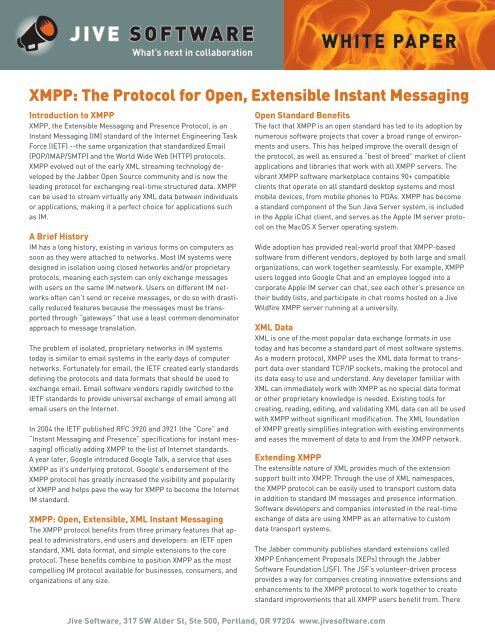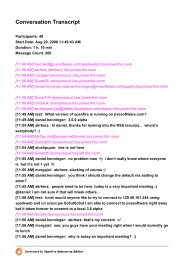XMPP: The Protocol for Open, Extensible Instant ... - Ignite Realtime
XMPP: The Protocol for Open, Extensible Instant ... - Ignite Realtime
XMPP: The Protocol for Open, Extensible Instant ... - Ignite Realtime
You also want an ePaper? Increase the reach of your titles
YUMPU automatically turns print PDFs into web optimized ePapers that Google loves.
Introduction to <strong>XMPP</strong><br />
<strong>XMPP</strong>, the <strong>Extensible</strong> Messaging and Presence <strong>Protocol</strong>, is an<br />
<strong>Instant</strong> Messaging (IM) standard of the Internet Engineering Task<br />
Force (IETF) --the same organization that standardized Email<br />
(POP/IMAP/SMTP) and the World Wide Web (HTTP) protocols.<br />
<strong>XMPP</strong> evolved out of the early XML streaming technology developed<br />
by the Jabber <strong>Open</strong> Source community and is now the<br />
leading protocol <strong>for</strong> exchanging real-time structured data. <strong>XMPP</strong><br />
can be used to stream virtually any XML data between individuals<br />
or applications, making it a perfect choice <strong>for</strong> applications such<br />
as IM.<br />
A Brief History<br />
IM has a long history, existing in various <strong>for</strong>ms on computers as<br />
soon as they were attached to networks. Most IM systems were<br />
designed in isolation using closed networks and/or proprietary<br />
protocols, meaning each system can only exchange messages<br />
with users on the same IM network. Users on different IM networks<br />
often can’t send or receive messages, or do so with drastically<br />
reduced features because the messages must be transported<br />
through “gateways” that use a least common denominator<br />
approach to message translation.<br />
<strong>The</strong> problem of isolated, proprietary networks in IM systems<br />
today is similar to email systems in the early days of computer<br />
networks. Fortunately <strong>for</strong> email, the IETF created early standards<br />
defining the protocols and data <strong>for</strong>mats that should be used to<br />
exchange email. Email software vendors rapidly switched to the<br />
IETF standards to provide universal exchange of email among all<br />
email users on the Internet.<br />
In 2004 the IETF published RFC 3920 and 3921 (the “Core” and<br />
“<strong>Instant</strong> Messaging and Presence” specifications <strong>for</strong> instant messaging)<br />
officially adding <strong>XMPP</strong> to the list of Internet standards.<br />
A year later, Google introduced Google Talk, a service that uses<br />
<strong>XMPP</strong> as it’s underlying protocol. Google’s endorsement of the<br />
<strong>XMPP</strong> protocol has greatly increased the visibility and popularity<br />
of <strong>XMPP</strong> and helps pave the way <strong>for</strong> <strong>XMPP</strong> to become the Internet<br />
IM standard.<br />
<strong>XMPP</strong>: <strong>Open</strong>, <strong>Extensible</strong>, XML <strong>Instant</strong> Messaging<br />
<strong>The</strong> <strong>XMPP</strong> protocol benefits from three primary features that appeal<br />
to administrators, end users and developers: an IETF open<br />
standard, XML data <strong>for</strong>mat, and simple extensions to the core<br />
protocol. <strong>The</strong>se benefits combine to position <strong>XMPP</strong> as the most<br />
compelling IM protocol available <strong>for</strong> businesses, consumers, and<br />
organizations of any size.<br />
WHITE PAPER<br />
<strong>XMPP</strong>: <strong>The</strong> <strong>Protocol</strong> <strong>for</strong> <strong>Open</strong>, <strong>Extensible</strong> <strong>Instant</strong> Messaging<br />
<strong>Open</strong> Standard Benefits<br />
<strong>The</strong> fact that <strong>XMPP</strong> is an open standard has led to its adoption by<br />
numerous software projects that cover a broad range of environments<br />
and users. This has helped improve the overall design of<br />
the protocol, as well as ensured a “best of breed” market of client<br />
applications and libraries that work with all <strong>XMPP</strong> servers. <strong>The</strong><br />
vibrant <strong>XMPP</strong> software marketplace contains 90+ compatible<br />
clients that operate on all standard desktop systems and most<br />
mobile devices, from mobile phones to PDAs. <strong>XMPP</strong> has become<br />
a standard component of the Sun Java Server system, is included<br />
in the Apple iChat client, and serves as the Apple IM server protocol<br />
on the MacOS X Server operating system.<br />
Wide adoption has provided real-world proof that <strong>XMPP</strong>-based<br />
software from different vendors, deployed by both large and small<br />
organizations, can work together seamlessly. For example, <strong>XMPP</strong><br />
users logged into Google Chat and an employee logged into a<br />
corporate Apple IM server can chat, see each other’s presence on<br />
their buddy lists, and participate in chat rooms hosted on a Jive<br />
Wildfire <strong>XMPP</strong> server running at a university.<br />
XML Data<br />
XML is one of the most popular data exchange <strong>for</strong>mats in use<br />
today and has become a standard part of most software systems.<br />
As a modern protocol, <strong>XMPP</strong> uses the XML data <strong>for</strong>mat to transport<br />
data over standard TCP/IP sockets, making the protocol and<br />
its data easy to use and understand. Any developer familiar with<br />
XML can immediately work with <strong>XMPP</strong> as no special data <strong>for</strong>mat<br />
or other proprietary knowledge is needed. Existing tools <strong>for</strong><br />
creating, reading, editing, and validating XML data can all be used<br />
with <strong>XMPP</strong> without significant modification. <strong>The</strong> XML foundation<br />
of <strong>XMPP</strong> greatly simplifies integration with existing environments<br />
and eases the movement of data to and from the <strong>XMPP</strong> network.<br />
Extending <strong>XMPP</strong><br />
<strong>The</strong> extensible nature of XML provides much of the extension<br />
support built into <strong>XMPP</strong>. Through the use of XML namespaces,<br />
the <strong>XMPP</strong> protocol can be easily used to transport custom data<br />
in addition to standard IM messages and presence in<strong>for</strong>mation.<br />
Software developers and companies interested in the real-time<br />
exchange of data are using <strong>XMPP</strong> as an alternative to custom<br />
data transport systems.<br />
<strong>The</strong> Jabber community publishes standard extensions called<br />
<strong>XMPP</strong> Enhancement Proposals (XEPs) through the Jabber<br />
Software Foundation (JSF). <strong>The</strong> JSF’s volunteer-driven process<br />
provides a way <strong>for</strong> companies creating innovative extensions and<br />
enhancements to the <strong>XMPP</strong> protocol to work together to create<br />
standard improvements that all <strong>XMPP</strong> users benefit from. <strong>The</strong>re<br />
Jive Software, 317 SW Alder St, Ste 500, Portland, OR 97204 www.jivesoftware.com
are nearly 200 XEPs today covering a wide range of functionality, including<br />
security enhancements, user experience improvements and<br />
VoIP (Internet telephony). XEPs allow the <strong>XMPP</strong> protocol to rapidly<br />
evolve and improve in an open, standards-based way.<br />
<strong>XMPP</strong> Networks Explained<br />
An <strong>XMPP</strong> network is composed of all the <strong>XMPP</strong> clients and servers<br />
that can reach each other on a single computer network. <strong>The</strong><br />
biggest <strong>XMPP</strong> network is available on the Internet and connects<br />
public <strong>XMPP</strong> servers. However, people are free to create private<br />
<strong>XMPP</strong> networks within a single company’s internal LAN, on secure<br />
corporate virtual private networks, or even within a private network<br />
running in a person’s home. Within each <strong>XMPP</strong> network, each user<br />
is assigned a unique <strong>XMPP</strong> address.<br />
Addresses - Just Like Email<br />
<strong>XMPP</strong> addresses look exactly the same as email addresses,<br />
containing a user name and a domain name. For example, sales@<br />
jivesoftware.com is a valid <strong>XMPP</strong> address <strong>for</strong> a user account named<br />
“sales” in the “jivesoftware.com” domain. It is common <strong>for</strong> an organization<br />
to issue the same <strong>XMPP</strong> address and email address to a<br />
user. Within the <strong>XMPP</strong> server, user accounts are frequently authenticated<br />
against the same common user account system used by the<br />
email system.<br />
<strong>XMPP</strong> addresses are generated and issued in the same way that<br />
email addresses are. Each <strong>XMPP</strong> domain is managed by the domain<br />
owner, and the <strong>XMPP</strong> server <strong>for</strong> that domain is used to create, edit,<br />
and delete user accounts. For example, the jivesoftware.com server<br />
is used to manage user accounts that end with “@jivesoftware.<br />
com”. If a company runs the jivesoftware.com server, the company<br />
sets its own policies and uses its own software to manage user<br />
accounts. If the domain is a hosted account on an Internet Service<br />
Provider (ISP) the ISP usually provides a web control panel to easily<br />
manage <strong>XMPP</strong> user accounts in the same way that email accounts<br />
are managed. <strong>The</strong> flexibility and control that the <strong>XMPP</strong> network provides<br />
is a major benefit of <strong>XMPP</strong> IM systems over proprietary public<br />
IM systems like AIM, MSN and Yahoo!, where all user accounts are<br />
hosted by a third party.<br />
Server Federation<br />
<strong>XMPP</strong> is designed using a federated, client-server architecture.<br />
Server federation is a common means of spreading resource usage<br />
and control between Internet services. In a federated architecture,<br />
each server is responsible <strong>for</strong> controlling all activities within its own<br />
domain and works cooperatively with servers in other domains as<br />
equal peers.<br />
In <strong>XMPP</strong>, each client connects to the server that controls its <strong>XMPP</strong><br />
domain. This server is responsible <strong>for</strong> authentication, message de-<br />
WHITE PAPER<br />
livery and maintaining presence in<strong>for</strong>mation <strong>for</strong> all users within the<br />
domain. If a user needs to send an instant message to a user outside<br />
of their own domain, their server contacts the external server<br />
that controls the “<strong>for</strong>eign” <strong>XMPP</strong> domain and <strong>for</strong>wards the message<br />
to that <strong>XMPP</strong> server. <strong>The</strong> <strong>for</strong>eign <strong>XMPP</strong> server takes care of<br />
delivering the message to the intended recipient within its domain.<br />
This same server-to-server model applies to all cross-domain data<br />
exchanges, including presence in<strong>for</strong>mation.<br />
<strong>XMPP</strong> server federation is modeled after the design of Internet<br />
email, which has shown that the design scales to include the entire<br />
Internet and provides the necessary flexibility and control to meet<br />
the needs of individual domains. Each <strong>XMPP</strong> domain can define the<br />
level of security, quality of service, and manageability that make<br />
sense <strong>for</strong> their organization.<br />
Conclusion<br />
<strong>XMPP</strong> is open, flexible and extensible, making it the protocol of<br />
choice <strong>for</strong> real-time communications over the Internet. It enables<br />
the reliable transport of any structured XML data between individuals<br />
or applications, including RPC and SOAP calls. Numerous mission-critical<br />
business applications use <strong>XMPP</strong>, including chat and IM,<br />
network management and financial trading. With inherent security<br />
features and support <strong>for</strong> cross-domain server federation, <strong>XMPP</strong> is<br />
more than able to meet the needs of the most demanding environments.<br />
About Jive Software<br />
Jive Software builds next-generation collaboration solutions. We are the developer<br />
of Wildfire and Spark, two leading professional <strong>Open</strong> Source projects<br />
<strong>for</strong> EIM, presence, and <strong>XMPP</strong>-based communications. Built using pure Java,<br />
Wildfire is a scalable, secure, cross-plat<strong>for</strong>m <strong>XMPP</strong> server that can be easily<br />
and quickly customized using simple plugins. Wildfire installs in a matter of<br />
minutes and provides enterprise-class features such as message auditing,<br />
archiving and LDAP integration. An enterprise edition of Wildfire is also<br />
available under a commercial license. Wildfire Enterprise is implemented<br />
as a standard plugin to the <strong>Open</strong> Source edition and provides an expanded<br />
set of features such as real-time reporting, advanced archiving and granular<br />
client control.<br />
Spark, a full-featured <strong>XMPP</strong> client, provides an exceptional IM user experience<br />
and is tightly integrated with the Wildfire Server. Spark’s plugin<br />
architecture allows you to buy or build plugins (Sparkplugstm) that add new<br />
application features tailored <strong>for</strong> your business. Spark is centrally managed<br />
from within the Wildfire administration console, making it easy to provision<br />
and update all clients on your network.<br />
Jive Software has over 1,400 customers globally, including IBM, Sun, Oracle,<br />
BEA, Deutsche Telekom, USJFCOM, Citrix and Toshiba.<br />
Jive Software, 317 SW Alder St, Ste 500, Portland, OR 97204 www.jivesoftware.com














